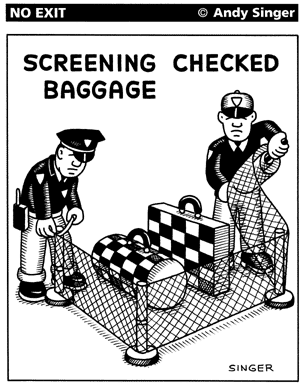Airport security issues
Airport security requirements, and the time it takes to deal with it, can vary widely. In general, travelers should contact their airline to find out how early they should arrive at the airport.
The the next section gives you an overview of what to expect when you are traveling through many of the world's airports, and below that is a table with links to more detailed information.
General security guidelines
- Carry-On Baggage: Air travelers are limited to one carry-on bag and one personal item (such as a purse or briefcase) on all flights. The carry-on advice page has other insights about common carry-on baggage problems passengers face. You can also review common baggage issues for both checked and carry-on luggage.
- Prohibited and Restricted Items:Before you leave your house, make sure you know what you can't take to the airport or carry on the plane. The most common restricted items that people accidentally take to the airport are liquid and gel containers that are too large. In general, anything that can start a fire, explode, or be used as a weapon is not allowed, or allowed only in checked bags.
- Documentation for domestic travel: In the US, there are a wide range of acceptable identification documents. Typically, a government-issued photo ID is required for travelers age 18 and over. All passengers will have to have a boarding pass or other boarding document.
- Documentation for international travel: In the US, all passengers on international flights, including children and infants, must have a passport. Depending on where you are going, you may also be required to have a visa.
- Check-in: If possible, check in and print your boarding passes before arriving at the airport. If you have checked bags, you will have to check your bags at airline counter or with the airline's curbside check in service. Travelers should contact their airline to see if curbside check in is available at the airport.
- Terminal Access: Normally, only ticketed passengers are allowed beyond the screener checkpoints, except for passengers who may need to be escorted to the gate, such as an unaccompanied child or someone with special medical needs.
- Electronic Items: Larger electronic items such as laptops may be subjected to additional screening, so be prepared to remove your electronic item from your carry-on bag for additional screening.
- Valuables: Jewelry and other valuables should always be kept on your person or in a carry-on bag.
- Metallic Items: Travelers should remove all metal objects prior to passing through the screening process. Smaller metal items like earrings may be left on.
You can also review AirSafe.com Top ten tips for dealing with security as well as the Top 10 baggage tips for other security advice concerning your bags. Also, review the common types of items banned and restricted from checked or carry on baggage before you pack for your trip.
Detailed security information
Additional air travel advice
Allow extra time for special circumstances: During busy periods, or when traveling with young children or infants, or with elderly or disabled passengers, arrive earlier than you usually would.
Do not leave your car unattended in front of the terminal
Airport parking rules are being strictly enforced and your car may be quickly ticketed and towed.
Getting to the airport: Take public transportation to the airport if possible. Parking and curbside access is likely to be controlled and limited.
Beware of unattended packages: If you see an unattended package or bag in the terminal, report it to the airport security staff or other airport authority.
Know what you are carrying: Watch your bags while you are at the airport and don't accept packages from strangers. Be prepared to answer questions about who packed your bags and whether you might have left them unattended at any time. Think carefully and answer honestly--criminals and terrorists often use unwitting passengers to carry bombs or other dangerous items on board aircraft, either by tricking passengers into carrying packages or by simply slipping items into unwatched bags. If you have any doubts, say so.
Humor is not an option:Do not joke about having a bomb or firearm in your possession. Security personnel are trained to react when they hear these words. Penalties can be severe, and can include the possibility of time in prison and/or fines.
Additional resources
Tips for the Novice Flyer
Podcast: TSA Screening Policies
Cartoon by Andy Singer
http://airsafe.com/issues/security.htm -- Revised 10 June 2015
